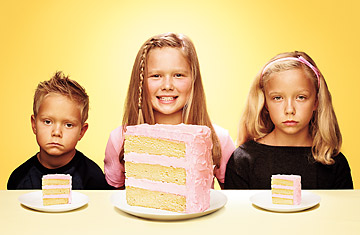
(4 of 5)
Whichever child is the favorite, once patterns are established, they're hard to break. Still, favoritism can fluctuate, depending on what are known as family domains. There's what happens inside the home and what happens outside it, what happens on the soccer field and what happens in the living room. The ex-jock father who favors his athletic son may be driven to distraction by the boy's restless energy when it comes time to have a conversation. When Dad is looking for quiet parent-child bonding, he may turn to his daughter. Over the course of a childhood, the son may still come out on top, but the daughter will get enough attention that the disparity may not wind up being significant.
"Favoritism patterns are pretty stable," says Corinna Jenkins Tucker, an associate professor of family studies at the University of New Hampshire. "But there are differences by domain. It's a problem when a child isn't favored in any area at all."
The Pain of the Second Best
For all this familial compensating, psychologists — to say nothing of parents themselves — rightly wonder what the long-term damage of favoritism may be. Can you go through your entire childhood looking enviously at the crowned prince or princess across the dinner table and not develop some psychic scars?
Not all experts agree on just what the impact of favoritism is, but as a rule, their advice to parents is simple: If you absolutely must have a favorite (and you must), keep it to yourself. Even if your kids see through the ruse, the mere act of trying to maintain it can help them preserve the emotional pretext too — a bit of denial that does little harm. What's more, the effort it takes to tell a benign lie is in its own way an act of love toward the unfavored child. "The very perception of unfavored treatment is bad," says Shawn Whiteman, an associate professor of family studies at Purdue University. "Perception is the key."
And a powerful one too. Psychologist Victoria Bedford of the University of Indianapolis has studied favoritism extensively, looking at the impact of what's known as LFS (least favored status) on children's self-esteem, socialization and relationships with other family members. No matter how she broke down her data, it all told her the same thing. "My main conclusion was how horrible favoritism is on siblings," she says flatly, and sibs themselves often agree.
Charles Dickens wrote poignantly about his own LFS, which he experienced most acutely during a period in which his family had only enough money to send his older sister to school while he worked in a bootblacking factory. Even as a highly celebrated adult, he never fully got past the experience. "My whole nature was so penetrated by the grief and humiliation," he wrote later in life, "that even now, famous and caressed and happy, I ... wander desolate back to that time in my life."
Clare Stocker, a research professor in developmental psychology at the University of Denver, put some statistical meat on the bones of Dickens' experience. She studied 136 sibling pairs, then returned to observe them again two more times at two-year intervals. Over that period, she found that kids who felt less loved than other siblings were more likely to develop anxiety, low self-esteem and depression. Some of the subjects would react by exhibiting behavioral problems, leading parents to crack down on them, only widening the gap between the kind of treatment Mom and Dad were meting out to them and the kind being lavished on the favored child.
The damage that can be done to an unfavored child throughout the long slog of childhood is easy to understand. Harder to fathom are the ways a best-loved son or daughter can suffer, but they're real as well — and go deeper than merely the resentment a first-tier child like Roseann Henry felt from her sister. The biggest risk may be that when you spend your early life enjoying the huzzahs of your parents, you may be unprepared for a larger society in which you're just one young adult out of many, with the special charms Mom and Dad saw in you invisible to everyone else.
The story of the family prince struggling with adulthood is a theme in both drama and history. Arthur Miller's Death of a Salesman is about more than the tragedy of its lead character, Willy Loman, as he loses both his livelihood and his dignity. It's also about the crisis of his sons — particularly Biff, the oldest — who grew up on a steady diet of paternal praise, only to find that others play by very different rules, expecting laurels to be earned before they're bestowed. When, as an adult, Biff at last learns the truth, he blames not himself, for his failure to achieve his dreams, but his father, for making him temperamentally ill equipped to do so.
